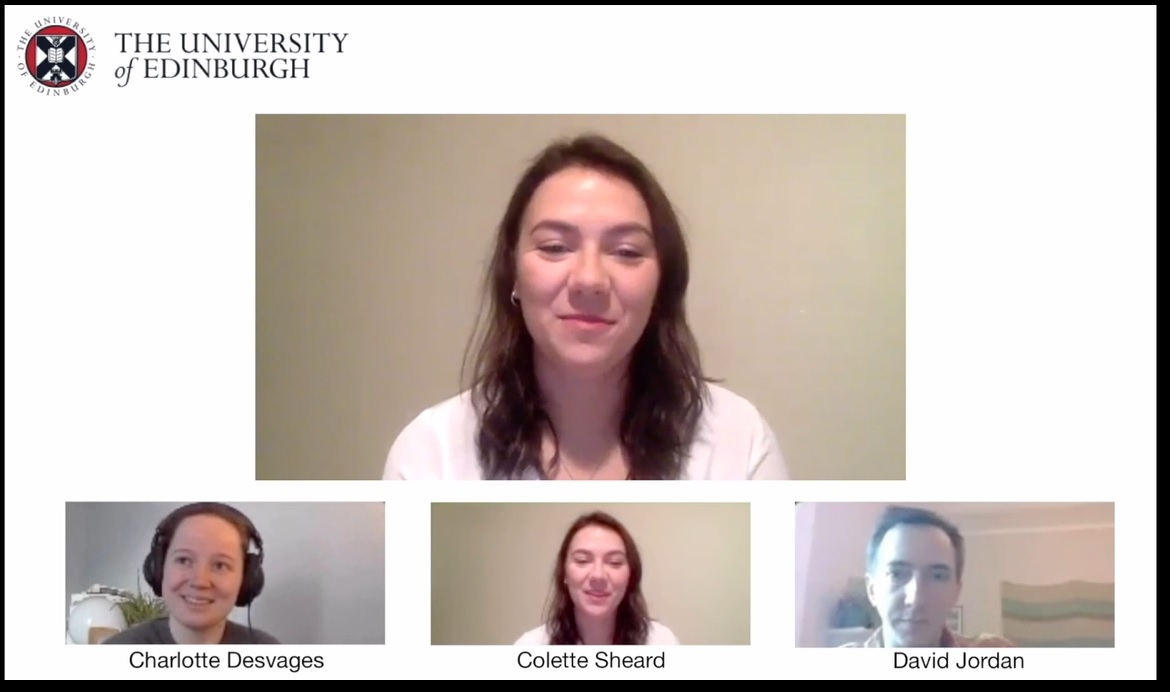This post features Colette Sheard, a former student in the School of Mathematics in conversation with David Jordan, Chancellor’s Fellow and Reader at the University of Edinburgh School of Mathematics and Charlotte Desvages, a University Teacher in Mathematical Computing about the ASID Creation Support Project (Adapt, Support, Implement, Deliver) which helped the school prepare for a successful transition to hybrid teaching. You can watch the video of the conversation or download a Podcast version above. Colette also shares her own experience working on the project in the blog post below…
Like many other 2020 graduates, my university experience was abruptly halted following the outbreak of Covid-19. After studying hard for the last four years, I was ready to face the world of work: I couldn’t wait to find a career that challenged me, and utilised the many skills I had developed at university. Instead, as the world seemingly came to a stand-still, I moved back in with my parents and frequently found myself worrying about an uncertain future. Therefore, when I received an email from Iain Gordon advertising a summer internship opportunity, I applied immediately.
The ASID Creation Assistant role presented an invaluable opportunity: Not only to begin my professional career, but also to help existing students by contributing a student-centred outlook on the development of hybrid teaching and learning. I have always been drawn towards education as a career path, so I was keen to learn about the components of effective teaching. I was especially interested in learning about how things would be adapted to allow hybrid teaching to be introduced, and what was required to ensure it would be a success. Our ever-expanding world of technology has been intensified by the arrival of Covid-19, and I hoped that this project would give me some first-hand experience insight into the virtual teaching arena, a potentially pivotal component of an evolving education system. Additionally, I knew that being employed by a world-renowned university straight after finishing my degree would look impressive on my CV. I was excited to gain professional experience and expand my network by collaborating with experienced academics. That said, I had no idea what to expect. The job description was detailed, but due to the unique circumstances underpinning the creation of the role, everyone involved was going in blind: I knew I would have to be adaptable, and prepare to help out with a wide variety of tasks.
After my first day, I remember being shocked by the number of people in the team. Despite the fact that the project had only just officially begun, it was obvious that a lot of thought had already gone into it. I was impressed by how much time and effort (and money!) the School of Mathematics was investing in the hybrid teaching program. I was also surprised at the level of responsibility we were given: I hadn’t even graduated yet, but I felt immediately an equally valued part of the team. From the outset, my efforts were recognised by everyone, ranging from the other undergrads right up to the Head of School. The high level of responsibility was a lot to get used to, but I enjoyed the challenge and soon got into the swing of things. There was a lot of support available, and we were frequently reminded to ask for help if we needed it. The nature of the work varied hugely, and we were actively encouraged to engage with an assortment of tasks, even ones that were unfamiliar or brand new. For example, I had no experience using STACK prior to this project. STACK is a world-leading online assessment system for mathematical sciences, and creating a STACK question requires fluency using HTML, Maxima, and TeX coding languages. To me, this was a daunting amalgamation, so I initially avoided STACK-tasks. However, I was encouraged to take part in one of the online training sessions, led by Christopher Sangwin, the creator of STACK, and one of my former professors. These sessions provided the opportunity to learn how to use the technology, and since then I have significantly developed my STACK coding skills. I was also able to experiment using video editing software, which is another thing I had very little prior experience of. By the end of the project, I had created and edited a video that documented some of the main tasks the team had undertaken. I really appreciated the creative freedom I was given with this task, and I felt proud when it was published on the university’s social media pages.
On a personal level, this project has been an extremely valuable experience. I have developed many practical, software-specific skills through frequent use of mathematical programmes like Python, LaTeX and STACK, all of which are likely to be highly relevant in my future career development. Furthermore, it was very insightful to experience an exclusively virtual working environment, especially as part of such a large team. As time has progressed, we have got to know each other really well. I might not have met many of the Creation Support team in real life, but I have made lots of friends!
The ultimate goal of the project was to create a substantial foundation to fully support students as they adapt to the hybrid teaching approach. I believe that this goal has been fulfilled, and I’m really pleased with what the team has achieved, especially in such a short time. Every aspect of student life, and potential changes introduced by hybrid teaching, were discussed and addressed. An extensive amount of time was spent investigating which technologies and teaching methods would be most effective for online learning. Maintaining interactivity and providing frameworks to enable students to work collaboratively online requires a surprising amount of experimentation and discussion! Many lecturers completely re-recorded their entire teaching material, and all content then had to be checked for clarity and subtitled to ensure it was accessible to all students. Working on this project made me realise that, as a student, it is very easy to overlook the preparation required to ensure a course runs smoothly. I feel proud to be a former student and current employee of a department that so highly prioritises the wellbeing and progression of each and every student.
 Colette Sheard
Colette Sheard
Colette Sheard is a recent graduate from the School of Mathematics. Colette was an ASID Creation Assistant for the School and helped support their successful transition to hybrid teaching and learning.
 Charlotte Desvages
Charlotte Desvages
Charlotte Desvages is a former PhD student and now University Teaching in the School of Mathematics. Charlotte is the course organiser for Computing and Numerics and Python Programming.
 David Jordan
David Jordan
David Jordan is a Chancellor’s Fellow and Reader at the University of Edinburgh School of Mathematics.


